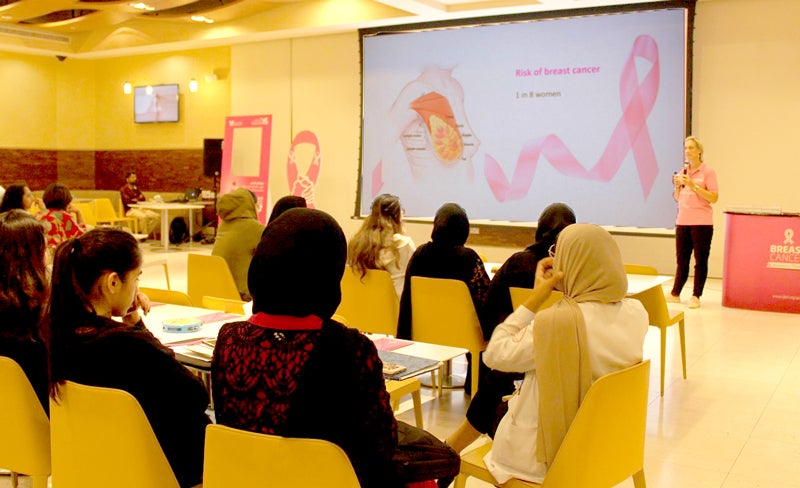
atar Biomedical Research Institute (QBRI), part of Hamad Bin Khalifa University (HBKU), hosted a series of activities and workshops to mark the international Breast Cancer Awareness month in October and educate the community on the disease, its symptoms, and the best means of prevention.
The awareness campaign, led by QBRI’s Cancer Research Center (CRC), extended in-house knowledge to the broader communities in Qatar and identified breast cancer as a leading cause of cancer-related death among women world-wide. The center’s activities reinforced early screening as a critical diagnostic measure that reduces breast cancer related mortalities.
According to the International Association of Cancer Registries (IARC), breast cancer accounts for 15 percent of all cancer-related deaths among women, globally. The prevalence of breast cancer worldwide stands at 30 percent.
As part of the month-long campaign, two scientists from CRC delivered talks at the Cancer Immunotherapy Workshop 2018 organized by Hamad Medical Corporation at the Sheraton Grand Doha from October 12 - 13.
Dr. Julie Decock, scientist at QBRI, highlighted her research work on the identification of Cancer Testis Antigens as novel targets for breast cancer treatment and how we can re-educate our body’s natural immune system to specifically recognize these molecules on cancer cells. Dr. Eyad Elkord, principal investigator at QBRI, discussed his research on the role of immune suppression in cancer as a critical mechanism used by tumors to escape immune recognition and destruction.
Commenting on the institute’s now-concluded community outreach initiatives, Dr. Omar El-Agnaf, acting executive director at QBRI, said: “One of the primary pillars of any research (and indeed academic) institution is to educate the public and extend knowledge beyond its laboratories. QBRI in particular was incepted to cater to the needs and health challenges facing the Qatari population, and, several years since its initiation; it continues to integrate this mission into all of its endeavors.”
Dr. Eyad Elkord, principal investigator at QBRI’s CRC, said: “The CRC specializes in unearthing novel techniques and technologies that contribute effectively to the advancement of knowledge, diagnosis, and treatment of cancer. A leading cause of health concern in Qatar and the world, breast cancer may be insidious but is also not invincible. The advancement of technology, widespread data, and lifestyle factors all show promises in terms of overcoming what poses today as the leading cause of cancer-related deaths among women worldwide.”
QBRI, in collaboration with the Qatar Cancer Society, also led a ‘Think Pink, Be Aware, Act, and Save Lives’ public awareness campaign as part of its community outreach and engagement efforts.
A presentation and a question-and-answer session held on October 17 at the North Nest, Qatar Foundation’s Female Housing within Education City, helped participants understand the importance of early detection, while clearing common misconceptions associated with the disease.
A similar event held on October 19 at Aspire’s Sugar and Spice provided the community with the opportunity to seek advice relating to breast cancer while learning more about how to pin-point early warning signs.
On Saturday, October 27, QBRI welcomed visitors to its stand at the Mall of Qatar where relevant information about breast cancer was shared through educational and fun activities
QBRI operates three research centers of excellences – Cancer Research Center, Diabetes Research Center, and the Neurological Disorders Research Center. Work at the CRC is in the areas of cancer immunology and immunotherapy with a special focus on breast cancer. The aim is to develop more effective novel biomarkers and therapeutic strategies that improve the survival rate of patients.
HBKU was founded with a mandate to advance and support translational and applied research in Qatar, the region, and beyond. The University is a catalyst and driver of positive change as reflected by the advancement of research, science, and technology in its scientific and academic initiatives.





